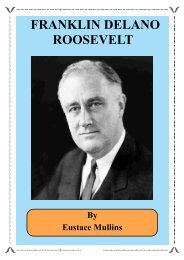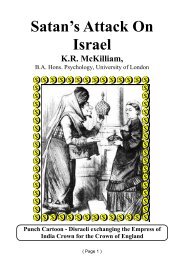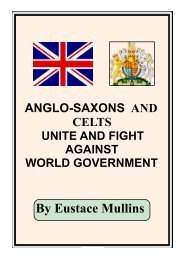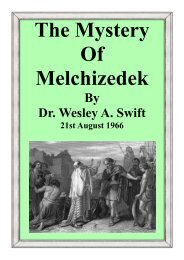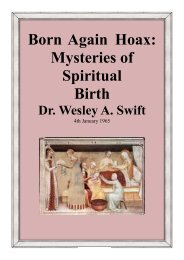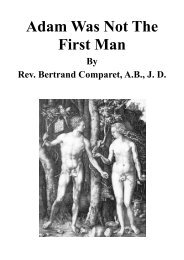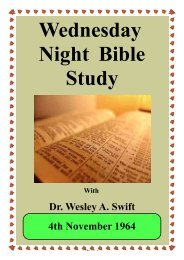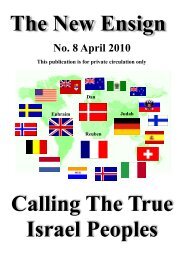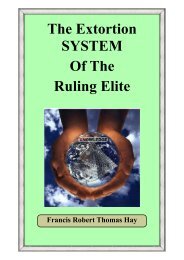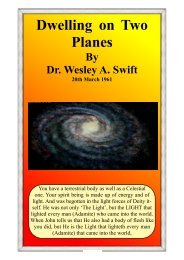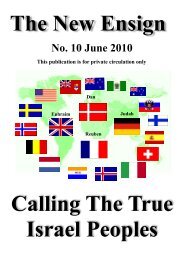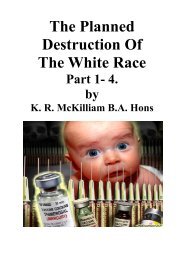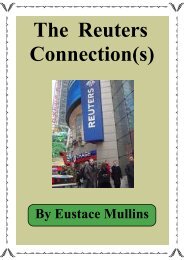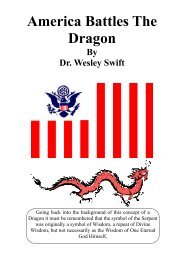Curse of Cannan - The New Ensign
Curse of Cannan - The New Ensign
Curse of Cannan - The New Ensign
You also want an ePaper? Increase the reach of your titles
YUMPU automatically turns print PDFs into web optimized ePapers that Google loves.
epresentatives <strong>of</strong> the Rothschilds. Today, it is the Chase Manhattan Bank, flagship <strong>of</strong> the<br />
Rockefeller fortune.<br />
Burr became Vice President in 1801, under Thomas Jefferson, who was President. Burr succeeded<br />
in persuading President Jefferson to appoint the Swiss banker, Albert Gallatin as Secretary <strong>of</strong><br />
the Treasury. Gallatin's family were prominent members <strong>of</strong> the Ruling Council <strong>of</strong> 200; his cousin<br />
was none other than the notorious Jacque Necker, whose financial policies had precipitated the<br />
French Revolution. Burr and Galatin now set about to implement policies which would wreck<br />
the young Republic. <strong>The</strong>y distributed bribes <strong>of</strong> gold along the frontier to Indians and renegades,<br />
so that they would murder the settlers; Gallatin then deliberately provoked the Whiskey Rebellion,<br />
the first insurrection against the government.<br />
On July 11, 1804, Burr shot Andrew Hamilton at Weehawken, <strong>New</strong> Jersey. He then had to flee<br />
from <strong>New</strong> York. John Jacob Astor gave him $40,000 to help him on his way, and later added<br />
another $70,000; these were enormous sums at that time. Burr fled to Philadelphia, where he<br />
conferred with Colonel Charles Williamson <strong>of</strong> British Intelligence. Two towns in <strong>New</strong> York,<br />
Williamson and East Williamson, are named after this British agent. This conference resulted in<br />
a letter from British Ambassador Anthony Merry to the London <strong>of</strong>fice: "I have just received an<br />
<strong>of</strong>fer from Mr. Burr, the actual Vice President <strong>of</strong> the United States, to lend his assistance to His<br />
Majesty's Government in any matter in which they may think fit to employ him, particularly in<br />
endeavouring to effect a separation <strong>of</strong> the western part <strong>of</strong> the United States from that which lies<br />
between the Atlantic and the mountains, in its whole extent. His proposition on this subject will<br />
be fully detailed to your lordship by Col. Williamson, who has been the bearer <strong>of</strong> them to me,<br />
and who will embark for England in a few days." This amazing document was unearthed many<br />
years later by the historian Henry Adams. It is one <strong>of</strong> the most startling evidences <strong>of</strong> high treason<br />
by an elected <strong>of</strong>ficial <strong>of</strong> the United States which has ever surfaced in any record. It was written<br />
on August 4, one month after the killing <strong>of</strong> Alexander Hamilton.<br />
<strong>The</strong> British plan for setting up a separate western nation in competition with the United States<br />
received a fatal setback when Napoleon sold the Louisiana Territory to the United States.<br />
Nevertheless, the plan was further pursued by Edward Livingston, who had been given $21,000<br />
by John Jacob Astor to go to Louisiana, where he became Grand Master <strong>of</strong> the Louisiana Lodge.<br />
Burr was later tried for treason in Richmond, Virginia. His attorney was Edmund Randolph,<br />
former Grand Master <strong>of</strong> Virginia; the case was heard by Chief Justice John Marshall, then Grand<br />
Master <strong>of</strong> Virginia. Although overwhelming evidence <strong>of</strong> Burr's guilt was presented, he was<br />
acquitted by Justice Marshall. It was a Masonic field day. Burr then traveled to London, where<br />
he informed customs <strong>of</strong>ficials, "<strong>The</strong> reasons for my visit are known to Lord Melville [Henry<br />
Dundas, chief <strong>of</strong> special operations, British Intelligence Service] and Prime Minister Canning."<br />
Burr then became an opium addict, enjoying the pleasures <strong>of</strong> the pipe with such luminaries as<br />
Jeremy Bentham and the Jardine family.<br />
Burr's accomplice, Edward Livingston, was later installed as Secretary <strong>of</strong> State by President<br />
Andrew Jackson; soon afterward, Livingston was formally installed as Grand High Priest <strong>of</strong> the<br />
Masons <strong>of</strong> the United States, which prompted ex-President John Quincy Adams to address to<br />
him his famous "Letters on the subject <strong>of</strong> Masonry." <strong>The</strong>se Letters noted that "Masonic oaths <strong>of</strong><br />
secrecy made it impossible for anyone to hold an <strong>of</strong>fice <strong>of</strong> public trust."<br />
Lord Shelburne and the agents <strong>of</strong> British Secret Intelligence service continued their plots against<br />
the Republic <strong>of</strong> the United States, aided by those traitors most aptly described In Disraeli's term,<br />
"the determined men <strong>of</strong> Masonry," men whose sale loyalty was to the cause <strong>of</strong> restoring the<br />
Temple <strong>of</strong> Solomon, and the placing <strong>of</strong> the wealth <strong>of</strong> the entire world therein. <strong>The</strong>ir dedication<br />
to secrecy received a considerable setback when one <strong>of</strong> their members, a Captain William Morgan<br />
defected and published a book describing some <strong>of</strong> their secret rituals. <strong>The</strong>y immediately murdered<br />
him. <strong>The</strong> case caused a nationwide sensation. An Anti-Masonic Party was formed, which for<br />
some years was headed by a Congressman from Pennsylvania, Thaddeus Stevens, who later<br />
( Page 70)



